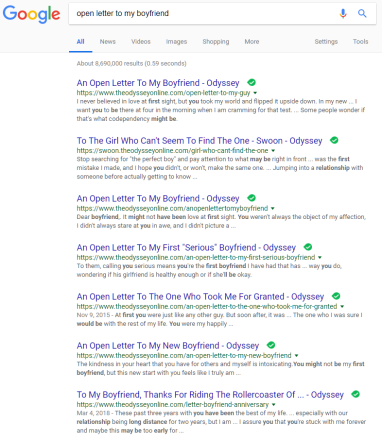Young people are increasingly told to pursue careers in actually lucrative fields (read: not writing). Despite this, publications and online media outlets for college students are flourishing — and perhaps without enough scrutiny.
As one of my favorite millennial writers, Lily Herman, put it, “young people don’t need more platforms — they need more editors.” Disheartening? Yeah. It sucks to be told that your work probably needs more work before it’s of any publishable quality. But I’m inclined to agree with Herman (disclaimer: she was my editor at an outlet I used to work for); I know that without the editors I learned from at my first and second internships, I would’ve probably been publishing the kind of crap that gets made fun of on Twitter. Getting told that your idea is objectively Very Bad is an arrow to the heart at first, until it’s a couple months later and you realize that yikes, I would’ve been skewered alive for that one.
I’ve seen that last sentence play out in actual scenarios over the last year. There was the infamous “my parents paid for my Coachella ticket and I don’t regret it” article, which ended up coming from a scammer. On the same website, someone posted a piece about how someone else was her boyfriend’s first love, but she, the writer, was the ultimate winner because he put a ring on her finger.

Those are just examples of bad ideas that should have been shot down. Unfortunately, this is all too common with publications geared toward readers between the ages of 13 and 24. Such publications are written and edited by young people who are still learning how to write for an audience, typically on an unpaid contributor model that top editors believe lead to a dip in editorial quality. There are so many pieces riddled with horrendous typos, or reviews written like unedited thoughts that came out of someone’s mind. When you’re putting work out into the vast reaches of the Internet, those stories stay there. And like I talked about in a previous blog post begging people to do a simple spellcheck on the work they publish, it ruins one’s credibility when there’s a lack of thought and consideration in writing broadcast to millions of people. Young media outlets seem to be where this behavior happens most frequently.
As a product of and advocate for student media, I’m probably the least likely candidate you’ll find railing against the problems of young people working in media. Of course, that’s not my argument at all; without fresh perspectives, outlets will misrepresent hundreds of millions of people around the world. Young adults think differently than their predecessors did, and their opinions, no matter how different, are vital to understanding the world. We’d be remiss not to include their voices.
The difference between working in legacy student media and writing for national online-only outlets, though, was the insistence that writers stick to our rigid in-house editing style and adhere to the Society of Professional Journalists’ Code of Ethics. This is not to say that other outlets don’t have such guides, but it’s apparent from the kind of work published by such organizations that they don’t have the same kinds of editors breathing fire down their backs to get it all right. Student media was key to my development as a confident writer and journalist. Without that kind of rigidity, I would have floated off into cyberspace thinking that I was a good writer, just to be ridiculed for something badly written down the line (which may happen regardless).
At the same time, people who want their voices heard must understand that they’re asking for feedback when they put their stories out there. That feedback should improve the way they write or the way they structure their thoughts.
The only way to get such good feedback is by working with an editor familiar with the nuances of the English language. Young editors can have such skill — after all, I’m 21 and writing this blog post for a professional editing class! — but a young writer’s best bet is to work at an institution where style and grammar guides have been set in stone for dozens, if not hundreds of years. I know from personal experience that the time I spent writing for millennial media outlets was fun, but I don’t know if it did the best for developing my writing skills. Working for established magazines and newspapers, though, taught me that I still had a ways to go on developing my personal voice.
Millennials trying out these new publications are giving public writing a test run, and that’s okay. Like I’ve mentioned before, such experiences are crucial to developing good writers. Even test runs, though, have to be good, challenging experiences to make them growth and learning opportunities. Those challenges have to come from editors who can put the kibosh on poor word choices and bad ideas, to prevent an even more horrible baptism by fire from the general public. That Coachella ticket article I talked about earlier? You should have seen the kind of Tweets that viral article was generating.
My hope is that young media realizes how essential good editors are to boosting a publication. Clicks may get readers to the website, but it doesn’t mean that they’ll stay there. It also doesn’t mean that they think very highly of your publication — just that the publication has produced work that they’re interested in.
In the meantime, I’ll blanch every time I see another horrendous typo or the sixth version of “reasons why my sorority sisters are my ride-or-dies.”
